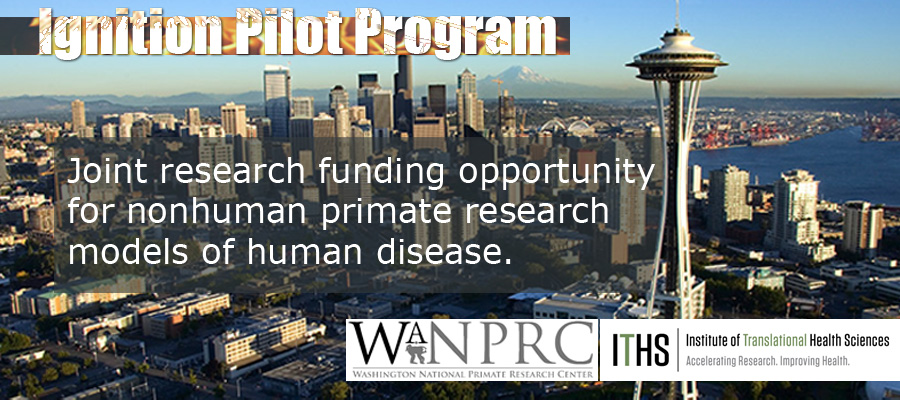 The WaNPRC Pilot Program, which is conducted jointly with the Institute for Translational Health Sciences, has been presented previously in an earlier Weekly Update. Since that time, the awards for the Fiscal Year 57 have been made and we want to present some short summaries of these protocols, to demonstrate the type(s) of research the Pilot Program supports. In short, the intent of the program is to support:
The WaNPRC Pilot Program, which is conducted jointly with the Institute for Translational Health Sciences, has been presented previously in an earlier Weekly Update. Since that time, the awards for the Fiscal Year 57 have been made and we want to present some short summaries of these protocols, to demonstrate the type(s) of research the Pilot Program supports. In short, the intent of the program is to support:
- Innovative, research endeavor
- An opportunity to collect preliminary data for future funding
- Support research with translational goals, moving toward human applications
“The Washington National Primate Research Center is committed to advancing the understanding of human disease by funding talented investigators,” said Dr. Michael Mustari, Director of WaNPRC. “The Pilot Project program makes a valuable contribution to our Center’s mission to serve as a national resource for innovative research. This work is necessary to advance scientific knowledge needed to cure diseases across the lifespan.”
2018 Ignition Awards Recipients:
Andrew McGuire, PhD: “Proof of Concept for an Epstein-Barr Virus Vaccine”
Epstein-Barr virus (EBV) is a causative agent of infectious mononucleosis and is linked with several malignancies. A vaccine preventing EBV infection would be a major public health benefit. Neutralizing antibodies are the primary correlate of protection for most vaccines, but it remains unknown if pre-existing neutralizing antibodies would protect against EBV exposure. Passive transfer of a neutralizing monoclonal antibody (Mab) prior to experimental viral challenge could answer this, but the near-obligate tropism of EBV for humans has hampered efforts to date. Rhesus lymphocryptovirus (RhLCV) is an ortholog of EBV, yet most Mabs that neutralize EBV do not cross react with RhLCV. We have isolated a potent neutralizing Mab from an EBV+ donor that blocks fusion of viral and host membranes. It cross reacts with RhLCV and similarly disrupts function. We propose to determine whether this Mab protects from experimental RhLCV infection in rhesus macaques. This will provide an important proof of concept for EBV vaccines aimed at eliciting neutralizing antibodies and will lay the groundwork for future studies.
Megan O’Connor, PhD: “Evaluation of SIV Co-Infection on ZIKV Pathogenesis in Pigtail Macaques”
Zika virus (ZIKV) and HIV are both global health concerns and are located in overlapping endemic areas, however currently there is a severe lack of knowledge regarding the impact HIV-ZIKV co-infection may have on viral pathogenesis, effectiveness of vaccines, or ZIKV vertical transmission. Presently, no animal model exists to address these concerns, but the non-human primate (NHP) model is valuable for studying HIV and ZIKV disease. In the adult pigtail macaque (PTM) we previously identified that monocytes are the major in vivo targets of ZIKV infection. Monocytes expand during HIV infection and mediate HIV invasion into the central nervous system (CNS), therefore we reasoned that HIV infection could promote ZIKV pathogenesis and neuroinvasion. Here, using SIV-infected macaques as a model, we propose to investigate the hypothesis that enhanced ZIKV pathogenesis occurs in HIV-infected patients. We will evaluate ZIKV pathogenesis and immune dynamics in acutely SIV-infected PTMs in relation to SIV-naive/ZIKV-infected historical controls. In Aim 1 we will evaluate monocytes during acute SIV infection and their potential as ZIKV cellular targets and in Aim 2 we will determine whether SIV co-infection enhances ZIKV pathogenesis and CNS invasion. These studies will provide new insight into ZIKV pathogenesis and will establish the first animal model of HIV-ZIKV co-infection.
The WaNPRC performs critical biomedical research leading to new advances in science and medicine. WaNPRC researchers are working to develop effective vaccines and therapies for HIV/AIDS and other infectious diseases as well as new advances in genetics, neuroscience, vision, and stem cell biology and therapy. The WaNPRC directly supports the National Institutes of Health’s mission to translate scientific advances into meaningful improvement in healthcare and medicine.